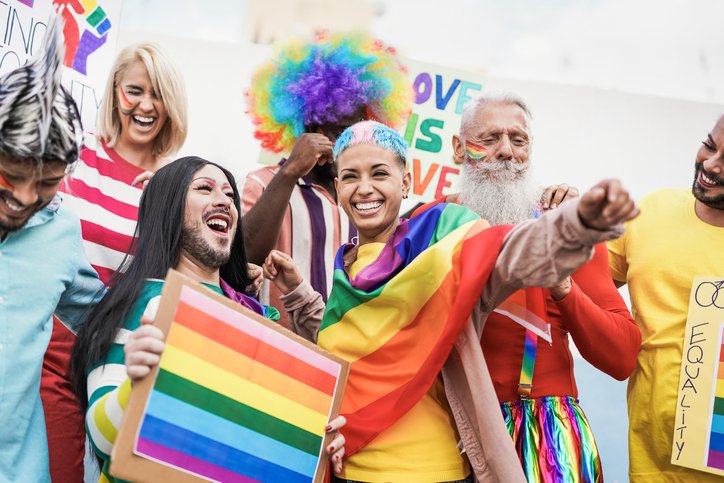
One day — when I die, rewind the heart attack. What power precipitated it? Unfurl the tumor. What policy prescribed it? Dissect the culture, not just my corpse. Diagnose the world. Hold one big stethoscope to its heart. Listen.
Is it breathing
or is it weeping?
— Excerpted from “Anatomy Lessons,” Your Wound / My Garden by ALOK)
When looking at many recent headlines regarding the LGBTQ+ community, it may look like we are alive and thriving for the first time in history. A record number of 7.1 percent of adults identify within the LGBTQ+ community — much influenced by Gen Z. We are also seeing record numbers of LGBTQ+ TV characters, and a historic number of LGBTQ+ candidates running for office. These headlines and statistics demonstrate how much the LGBTQ+ community is increasing representation in a variety of societal contexts … but they also don’t share the full story.
We are here and have always existed.
With record numbers of people identifying within the LGBTQ+ community in the U.S., as well as globally, it is important to consider why this expansion is happening, and why it has needed to happen at all.
To be clear, LGBTQ+ folks have always existed. Language, safety, and acceptance have evolved over time, but LGBTQ+ folks have always been here.
To be clear, LGBTQ+ folks have always existed. Language, safety, and acceptance have evolved over time, but LGBTQ+ folks have always been here. Share on XAs the poet ALOK points out in the opening words, there is much below the surface that impacts our daily lives. We are not immune to the insidious impacts of (neo)colonialism, capitalism, heteropatriarchy, homophobia, transphobia, white nationalism, ableism, etc. These systems — and how we enforce them upon each other and within ourselves — control our bodies, our lives, our identities.
Through the limitations of language rooted in colonialism, we have been forced to define ourselves. There are categories that have been distinguished because there is an established norm. When deviations from the norm exist, they need a coming out story, a descriptive word that defines them in relation to the norm, rather than existence beyond the norm. As if our existence is only legitimate in comparison to a set standard, a set form, a set presentation.
Through limitations of language rooted in colonialism, we are forced to define ourselves. When deviations from the norm exist, they need a coming out story to define them in relation to the norm, rather than existence beyond. Share on XUltimately, these systems benefit a capitalist society which feeds on power and control that is upheld through hierarchy, dehumanization, and oppression. All of this is actualized through policy within this country and around the world, and upheld through social norms, deadly violence, and, at times, inaction.
HIV/AIDS Epidemic
It would be remiss to not acknowledge the HIV/AIDS epidemic within this conversation. We lost a generation of LGBTQ+ folks to the lack of action, support, and intervention during the onset of the HIV/AIDS epidemic in the 1980s. Even though the CDC first documented HIV/AIDS in 1981, it took until 1985 before some in the Reagan administration even mentioned the word AIDS. By that point, so many lives were impacted and countless were lost, that the epidemic was too big to ignore.
This response emphasized the societal perceptions of the LGBTQ+ community as “other” and not worth the attention or protection of the government. These perceptions have been deeply influenced by the lasting legacy of colonialism (which continues to be reinforced by present-day capitalism), the spread of Christianity, and the influence of the Church.
Colonization
Many anti-LGBTQ+ laws and sentiments were established and normalized during colonialism — the violent efforts of Western powers to create dominance and control globally. Often these laws stemmed from fundamentalist Christian attitudes — spread by missionaries, as well as through violence, around the world. These narratives erased the history and existence of the fluidity of gender and sexuality that existed in many Indigenous and Native communities around the world. So much so, that many Africans have been led to believe being anti-gay is part of their culture and that homosexuality is a “white disease.” This is a false narrative that perpetuates violence, erasure, oppression, and marginalization of and toward LGBTQ+ folks. Even further, these sentiments have created a narrative linking the toleration of homosexuality to neo-colonial imposition.
Many anti-LGBTQ+ laws and sentiments were established and normalized during colonialism — the violent efforts of Western powers to create dominance and control globally. Share on XThis history is often left out of discussions of global LGBTQ+ inclusion and acceptance and plays a major role in historical accounts of LGBTQ+ folks having been erased, disillusioned, or violently denied.
Societal Pressures and The Church
In many times and places throughout history, the social inclusion of LGBTQ+ folks has been troubled. Societal norms established through colonialism and the spread of Christianity/the Church have shaped the face of the safety, or more specifically, the lack thereof, for LGBTQ+ folks. In an effort to maintain some level of security, many LGBTQ+ folks never “came out” or felt they could be themselves within society.
Norms established through colonialism and the spread of Christianity have shaped the face of the safety for LGBTQ+ folks. In an effort to maintain some level of security, many never 'came out' or felt they could be themselves Share on XIn order for capitalism to thrive and continue to benefit those in power, control has been inserted in every level of our personal lives: from Evangelical Christianity influencing public opinions on abortion to the emphasis on the nuclear family and the “American Dream” — “Man and Wife,” white picket fence, 2.5 kids and all — and the intentional disconnection of joy, pleasure, play, and fun from our everyday lives (because our purpose is to be productive and make more and more and more and more). Why does this matter so much for the Church? In “A Brief History of Queer Language Before Queer Identity,” Jeanna Kadlec explains:
“In History of Sexuality, [Michel] Foucault famously wrote that sexuality had replaced the soul as the question in which society had become most interested: no longer were we primarily concerned with the state of a person’s eternal wellbeing, but instead with whom and how they preferred to spend their evening hours. (In this, we find something of an answer to why the Church has pursued and hunted and restricted sexuality to the far corners of the earth: it is, simply put, its competition.) This replacing of the soul with sexuality is a 20th century shift, a modern question.”
This highlights how the Church may view matters of the personal life to be a threat to the Institution. When that Institution historically has shaped public opinion, societal norms, violence, and persecution of LGBTQ+ folks, any threat is a threat to its dominance and control over society that works to benefit and uphold the capitalist oligarchical regime in the U.S. LGBTQ+ folks have been considered a sin, non-humane, and unnatural — which doesn’t leave much room for pride and belonging, does it?
History of Language
Language is a living tool that continuously evolves, riddled with limitations and contradictions, as well as the power to connect, communicate, and imagine. As language evolves, so has the acronym for the LGBTQ+ community. But language hasn’t always been accessible, or safe, to folks who may have identified within the LGBTQ+ community.
Many of the terms we use today — gay and queer, for example — are reclaimed words that originally were used to dehumanize, ridicule, and shame human beings for their self-expression and sexuality. As Kadlec identifies, “Categories for LGBTQ+ people were principally used as medical categories (to label what was wrong with them) and legal categories (to punish them for their ‘wrongness.’)” Given this history, it makes sense why many people either chose not to use the language that was available to them, or didn’t have any affirming and validating language available to them in the first place.
It is also interesting to consider Kadlec’s observation that “Queers are one of those few groups on the margins who are — not always, but often — raised in natal families where we are alone in our experience. Alone, to navigate the terrain. Alone, to find our history.” So much of our lives is spent unlearning what we have been conditioned to believe about ourselves and how we are supposed to show up, seeking community with folks who understand, and learning about people, past and present, who are and may have been queer like us.
We have had to reclaim our identities, cultivate our own chosen families, and protect ourselves against the law, judgment, hate, and violence — including death. Yet, many LGBTQ+ folks wouldn’t change anything about our identity — because we know we are not the problem, but rather it is the many systems of oppression we are forced to live under. We have always been here, and we are here to stay —no matter how much the State tries to wipe us and our history out of consciousness.
Many LGBTQ+ folks wouldn’t change anything about our identity — because we know we are not the problem, but rather it is the many systems of oppression we are forced to live under. Share on XWhat is beautiful about the evolution of language is that the future is ours to write. LGBTQ+ folks are more likely to be “out” and proud now — whether in politics or TV — but there are still so many mountains left to move in order to create a world where LGBTQ+ folks can thrive, and not just try to survive.


















